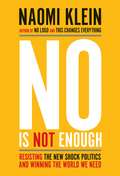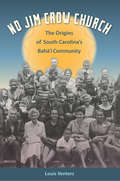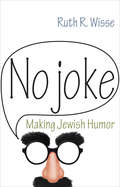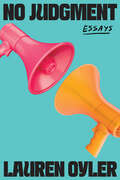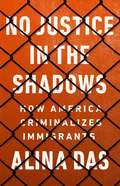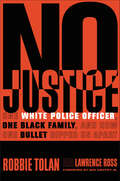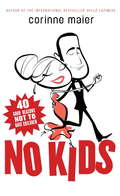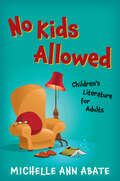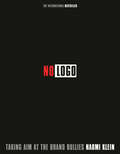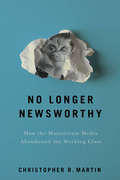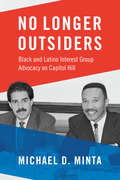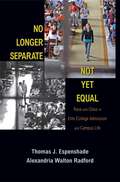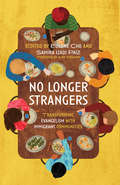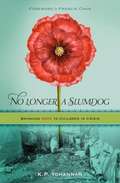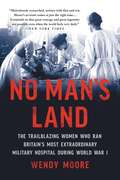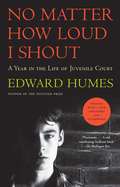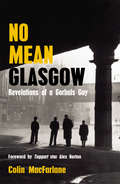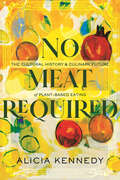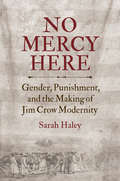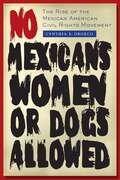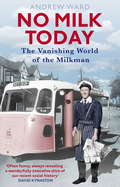- Table View
- List View
No Is Not Enough: Resisting the New Shock Politics and Winning the World We Need
by Naomi Klein"Trump is extreme but he's not a Martian. He is the logical conclusion of many of the most dangerous trends of the past half-century. He is the personification of the merger of humans and corporations--a one-man megabrand, with wife and children as spin-off brands. This book is to help understand how we arrived at this surreal political moment, how to keep it from getting a lot worse, and how, if we keep our heads, we can flip the script and seize the opportunity to make things a whole lot better in a time of urgent need. A tool-kit for shock-resistance." --from the Introduction The election of Donald Trump produced a frightening escalation in a world of cascading crises. The Trump Administration's vision--the deconstruction of the welfare and regulatory state, the unleashing of a fossil fuel frenzy (which requires the sweeping aside of climate science) and an all-out attack on vulnerable communities under the guise of a war on crime and terrorism--will generate wave after wave of crises and shocks around the world, to the economy, to national security, to the environment. In No Is Not Enough, Naomi Klein embraces a lively conversation with the reader to expose the forces behind Trump's success and explain why he is not an aberration but the product of our time--Reality TV branding, celebrity obsession and CEO-worship, Vegas and Guantanamo, fake news and vulture bankers all rolled into one. And she shares a bold vision, a clear-eyed perspective on how to break the spell of his shock tactics, counter the rising chaos and divisiveness at home and abroad, and win the world we need.
No Is Not Enough: Resisting the New Shock Politics and Winning the World We Need
by Naomi Klein"Trump is extreme but he's not a Martian. He is the logical conclusion of many of the most dangerous trends of the past half-century. He is the personification of the merger of humans and corporations--a one-man megabrand, with wife and children as spin-off brands. This book is to help understand how we arrived at this surreal political moment, how to keep it from getting a lot worse, and how, if we keep our heads, we can flip the script and seize the opportunity to make things a whole lot better in a time of urgent need. A tool-kit for shock-resistance." --from the Introduction The election of Donald Trump produced a frightening escalation in a world of cascading crises. The Trump Administration's vision--the deconstruction of the welfare and regulatory state, the unleashing of a fossil fuel frenzy (which requires the sweeping aside of climate science) and an all-out attack on vulnerable communities under the guise of a war on crime and terrorism--will generate wave after wave of crises and shocks around the world, to the economy, to national security, to the environment. In No Is Not Enough, Naomi Klein embraces a lively conversation with the reader to expose the forces behind Trump's success and explain why he is not an aberration but the product of our time--Reality TV branding, celebrity obsession and CEO-worship, Vegas and Guantanamo, fake news and vulture bankers all rolled into one. And she shares a bold vision, a clear-eyed perspective on how to break the spell of his shock tactics, counter the rising chaos and divisiveness at home and abroad, and win the world we need.
No Jim Crow Church: The Origins of South Carolina's Bahá'í Community
by Louis Venters"A richly detailed study of the rise of the Bahá’í Faith in South Carolina. There isn’t another study out there even remotely like this one."--Paul Harvey, coauthor of The Color of Christ: The Son of God and the Saga of Race in America "A pioneering study of how and why the Bahá’í Faith became the second largest religious community in South Carolina. Carefully researched, the story told here fills a significant gap in our knowledge of South Carolina's rich and diverse religious history."--Charles H. Lippy, coauthor of Religion in Contemporary America The emergence of a cohesive interracial fellowship in Jim Crow-era South Carolina was unlikely and dangerous. However, members of the Bahá’í Faith in the Palmetto State rejected segregation, broke away from religious orthodoxy, and defied the odds, eventually becoming the state’s largest religious minority. The religion, which emphasizes the spiritual unity of all humankind, arrived in the United States from the Middle East at the end of the nineteenth century via urban areas in the Northeast and Midwest. Expatriate South Carolinians converted and when they returned home, they brought their newfound religion with them. Despite frequently being the targets of intimidation, and even violence, by neighbors, the Ku Klux Klan, law enforcement agencies, government officials, and conservative clergymen, the Bahá’ís remained resolute in their faith and their commitment to an interracial spiritual democracy. In the latter half of the twentieth century, their numbers continued to grow, from several hundred to over twenty thousand. In No Jim Crow Church, Louis Venters traces the history of South Carolina’s Bahá’í community from its early origins through the civil rights era and presents an organizational, social, and intellectual history of the movement. He relates developments within the community to changes in society at large, with particular attention to race relations and the civil rights struggle. Venters argues that the Bahá’ís in South Carolina represented a significant, sustained, spiritually-based challenge to the ideology and structures of white male Protestant supremacy, while exploring how the emergence of the Bahá’í Faith in the Deep South played a role in the cultural and structural evolution of the religion.
No Joke: Making Jewish Humor (Library of Jewish Ideas #4)
by Ruth R. WisseWhy the genius of Jewish humor runs risks as well as rewardsHumor is the most celebrated of all Jewish responses to modernity. In this book, Ruth Wisse evokes and applauds the genius of spontaneous Jewish joking—as well as the brilliance of comic masterworks by writers like Heinrich Heine, Sholem Aleichem, Isaac Babel, S. Y. Agnon, Isaac Bashevis Singer, and Philip Roth. At the same time, Wisse draws attention to the precarious conditions that call Jewish humor into being—and the price it may exact from its practitioners and audience.Wisse broadly traces modern Jewish humor around the world, teasing out its implications as she explores memorable and telling examples from German, Yiddish, English, Russian, and Hebrew. Among other topics, the book looks at how Jewish humor channeled Jewish learning and wordsmanship into new avenues of creativity, brought relief to liberal non-Jews in repressive societies, and enriched popular culture in the United States.Even as it invites readers to consider the pleasures and profits of Jewish humor, the book asks difficult but fascinating questions: Can the excess and extreme self-ridicule of Jewish humor go too far and backfire in the process? And is "leave 'em laughing" the wisest motto for a people that others have intended to sweep off the stage of history?
No Judgment: Essays
by Lauren Oyler"The essay collection everyone’s talking about."—New YorkA MOST ANTICIPATED BOOK OF 2024: Elle, The Millions, LitHub, Nylon, BookPage, PureWow, and moreFrom the national bestselling novelist and essayist, a groundbreaking collection of brand-new pieces about the role of cultural criticism in our ever-changing world.In her writing for Harper’s, the London Review of Books, The New Yorker, and elsewhere, Lauren Oyler has emerged as one of the most trenchant and influential critics of her generation, a talent whose judgments on works of literature—whether celebratory or scarily harsh—have become notorious. But what is the significance of being a critic and consumer of media in today’s fraught environment? How do we understand ourselves, and each other, as space between the individual and the world seems to get smaller and smaller, and our opinions on books and movies seem to represent something essential about our souls? And to put it bluntly, why should you care what she—or anyone—thinks?In this, her first collection of essays, Oyler writes with about topics like the role of gossip in our exponentially communicative society, the rise and proliferation of autofiction, why we’re all so “vulnerable” these days, and her own anxiety. In her singular prose—sharp yet addictive, expansive yet personal—she encapsulates the world we live and think in with precision and care, delivering a work of cultural criticism as only she can.Bringing to mind the works of such iconic writers as Susan Sontag, Pauline Kael, and Terry Castle, No Judgment is a testament to Lauren Oyler’s inimitable wit and her quest to understand how we shape the world through culture. It is a sparkling nonfiction debut from one of today’s most inventive thinkers.
No Justice in the Shadows: How America Criminalizes Immigrants
by Alina DasThis provocative account of our immigration system's long, racist history reveals how it has become the brutal machine that upends the lives of millions of immigrants today.Each year in the United States, hundreds of thousands of people are arrested, imprisoned, and deported, trapped in what leading immigrant rights activist and lawyer Alina Das calls the "deportation machine." The bulk of the arrests target people who have a criminal record -- so-called "criminal aliens" -- the majority of whose offenses are immigration-, drug-, or traffic-related. These individuals are uprooted and banished from their homes, their families, and their communities.Through the stories of those caught in the system, Das traces the ugly history of immigration policy to explain how the U.S. constructed the idea of the "criminal alien," effectively dividing immigrants into the categories "good" and "bad," "deserving" and "undeserving." As Das argues, we need to confront the cruelty of the machine so that we can build an inclusive immigration policy premised on human dignity and break the cycle once and for all.
No Justice: One White Police Officer, One Black Family, and How One Bullet Ripped Us Apart
by Lawrence Ross Robbie TolanThe harrowing true story of Robbie Tolan, a young black man who was shot in the chest by a white police officer . . . in his own driveway.NO JUSTICE is the harrowing story of Robbie Tolan, who early on one New Year's Eve morning, found himself being rushed to the hospital. A white police officer had shot him in the chest after mistakenly accusing him of stealing his own car...while in his own driveway. In a journey that took nearly a decade, Tolan and his family saw his case go before the United States Supreme Court in a groundbreaking decision, while Tolan struggled with how to put his life back together. Holding him together through this journey was the strength of his mother and father, his faith in God, and an impenetrable belief that he deserved justice like any other American who'd been wronged. NO JUSTICE is the story about what happened after the cameras and social media protests went away. Robbie Tolan was left with the physical and mental devastation from having his body violated by someone who was supposed to serve and protect him. His story reminds us that police brutality is not a theoretical talking point in a larger nationwide argument. This story is about Robbie Tolan courageously picking up the pieces of his life, even as he fights for justice for all.
No Kids
by Corinne MaierA mother of two herself, Maier makes her deadly serious, if at times laugh-out-loud-funny, argument with all the unbridled force of her famously wicked intellect. In forty to-the-point, impressively erudite chapters drawing on the realms of history, child psychology, politics, and the environment, Maier effortlessly skewers the idealized notion of parenthood as a natural and beautiful endeavour. Enough with this "baby-mania" that is plaguing modern society, says Maier, it's nothing but brainwashing. Are you prepared to give up your free time, dinners with friends, spontaneous romantic getaways, and even the luxury of uninterrupted thought for the "vicious little dwarves" that will treat you like their servant, cost you hundreds of thousands of dollars, and end up resenting you? Speaking to the still "child-free", to fellow suffering parents, and to adamant procreationists alike, No Kids is a controversial, thought-provoking, and undeniably entertaining read. Reasons to avoid having kids: *You will lose touch with your friends *Your sex life will be over *Children cost a fortune *Child-rearing is endless drudgery *Vacations will be nightmares *You'll lose your identity and become just "mom" or "dad" *Your children will become mindless drones of capitalism *The planet's already overcrowded *Your children will inevitably disappoint you
No Kids Allowed: Children's Literature for Adults
by Michelle Ann AbateChildren's literature isn't just for children anymore. This original study explores the varied forms and roles of children's literature—when it's written for adults.What do Adam Mansbach's Go the F**k to Sleep and Barbara Park's MA! There's Nothing to Do Here! have in common? These large-format picture books are decidedly intended for parents rather than children. In No Kids Allowed, Michelle Ann Abate examines a constellation of books that form a paradoxical new genre: children's literature for adults. Distinguishing these books from YA and middle-grade fiction that appeals to adult readers, Abate argues that there is something unique about this phenomenon. Principally defined by its form and audience, children's literature, Abate demonstrates, engages with more than mere nostalgia when recast for grown-up readers. Abate examines how board books, coloring books, bedtime stories, and series detective fiction written and published specifically for adults question the boundaries of genre and challenge the assumption that adulthood and childhood are mutually exclusive.
No Logo (10th Anniversary Edition)
by Naomi KleinThe tenth anniversary edition of the international bestseller with an updated introduction by Naomi Klein. In the last decade No Logo has become an international phenomenon. Equal parts journalistic expose, mall-rat memoir, and political and cultural analysis, it vividly documents the invasive economic practices and damaging social effects of the ruthless corporatism that characterizes many of our powerful institutions. As the world faces another depression, Naomi Klein's analysis of the branded world we all live in proves not only astonishingly prescient but more vital and timely than ever. No Logo became "the movement bible" that put the new grassroots resistance to corporate manipulation into clear perspective. It tells a story of rebellious rage and self-determination in the face of our branded world, calling for a more just, sustainable economic model and a new kind of proactive internationalism. Since her book The Shock Doctrine was published last year, Klein, now thirty-eight, has become the most visible and influential figure on the American left--what Howard Zinn and Noam Chomsky were thirty years ago.
No Longer Newsworthy: How the Mainstream Media Abandoned the Working Class
by Christopher R. MartinUntil the recent political shift pushed workers back into the media spotlight, the mainstream media had largely ignored this significant part of American society in favor of the moneyed "upscale" consumer for more than four decades. Christopher R. Martin now reveals why and how the media lost sight of the American working class and the effects of it doing so. The damning indictment of the mainstream media that flows through No Longer Newsworthy is a wakeup call about the critical role of the media in telling news stories about labor unions, workers, and working-class readers. As Martin charts the decline of labor reporting from the late 1960s onwards, he reveals the shift in news coverage as the mainstream media abandoned labor in favor of consumer and business interests. When newspapers, especially, wrote off working-class readers as useless for their business model, the American worker became invisible. In No Longer Newsworthy, Martin covers this shift in focus, the loss of political voice for the working class, and the emergence of a more conservative media in the form of Christian television, talk radio, Fox News, and conservative websites.Now, with our fractured society and news media, Martin offers the mainstream media recommendations for how to push back against right-wing media and once again embrace the working class as critical to its audience and its democratic function.
No Longer Outsiders: Black and Latino Interest Group Advocacy on Capitol Hill
by Michael D. MintaWith the rise of Black Lives Matter and immigrant rights protests, critics have questioned whether mainstream black and Latino civil rights organizations such as the NAACP and UnidosUS are in touch with the needs of minorities—especially from younger generations. Though these mainstream groups have relied on insider political tactics, such as lobbying and congressional testimony, to advocate for minority interests, Michael D. Minta argues that these strategies are still effective tools for advocating for progressive changes. In No Longer Outsiders, Minta provides a comprehensive account of the effectiveness of minority civil rights organizations and their legislative allies. He finds that the organizations’ legislative priorities are consistent with black and Latino preferences for stronger enforcement of civil rights policy and immigration reform. Although these groups focus mainly on civil rights for blacks and immigration issues for Latinos, their policy agendas extend into other significant areas. Minta concludes with an examination of how diversity in Congress helps groups gain greater influence and policy success despite many limits placed upon them.
No Longer Outsiders: Black and Latino Interest Group Advocacy on Capitol Hill
by Michael D. MintaWith the rise of Black Lives Matter and immigrant rights protests, critics have questioned whether mainstream black and Latino civil rights organizations such as the NAACP and UnidosUS are in touch with the needs of minorities—especially from younger generations. Though these mainstream groups have relied on insider political tactics, such as lobbying and congressional testimony, to advocate for minority interests, Michael D. Minta argues that these strategies are still effective tools for advocating for progressive changes. In No Longer Outsiders, Minta provides a comprehensive account of the effectiveness of minority civil rights organizations and their legislative allies. He finds that the organizations’ legislative priorities are consistent with black and Latino preferences for stronger enforcement of civil rights policy and immigration reform. Although these groups focus mainly on civil rights for blacks and immigration issues for Latinos, their policy agendas extend into other significant areas. Minta concludes with an examination of how diversity in Congress helps groups gain greater influence and policy success despite many limits placed upon them.
No Longer Outsiders: Black and Latino Interest Group Advocacy on Capitol Hill
by Michael D. MintaWith the rise of Black Lives Matter and immigrant rights protests, critics have questioned whether mainstream black and Latino civil rights organizations such as the NAACP and UnidosUS are in touch with the needs of minorities—especially from younger generations. Though these mainstream groups have relied on insider political tactics, such as lobbying and congressional testimony, to advocate for minority interests, Michael D. Minta argues that these strategies are still effective tools for advocating for progressive changes. In No Longer Outsiders, Minta provides a comprehensive account of the effectiveness of minority civil rights organizations and their legislative allies. He finds that the organizations’ legislative priorities are consistent with black and Latino preferences for stronger enforcement of civil rights policy and immigration reform. Although these groups focus mainly on civil rights for blacks and immigration issues for Latinos, their policy agendas extend into other significant areas. Minta concludes with an examination of how diversity in Congress helps groups gain greater influence and policy success despite many limits placed upon them.
No Longer Separate, Not Yet Equal: Race and Class in Elite College Admission and Campus Life
by Alexandria Walton Radford Thomas J. EspenshadeThe truth about America's elite colleges and universities—who gets in, who succeeds, and whyAgainst the backdrop of today's increasingly multicultural society, are America's elite colleges admitting and successfully educating a diverse student body? No Longer Separate, Not Yet Equal pulls back the curtain on the selective college experience and takes a rigorous and comprehensive look at how race and social class impact each stage—from application and admission, to enrollment and student life on campus. Arguing that elite higher education contributes to both social mobility and inequality, the authors investigate such areas as admission advantages for minorities, academic achievement gaps tied to race and class, unequal burdens in paying for tuition, and satisfaction with college experiences.The book's analysis is based on data provided by the National Survey of College Experience, collected from more than nine thousand students who applied to one of ten selective colleges between the early 1980s and late 1990s. The authors explore the composition of applicant pools, factoring in background and "selective admission enhancement strategies"—including AP classes, test-prep courses, and extracurriculars—to assess how these strengthen applications. On campus, the authors examine roommate choices, friendship circles, and degrees of social interaction, and discover that while students from different racial and class circumstances are not separate in college, they do not mix as much as one might expect. The book encourages greater interaction among student groups and calls on educational institutions to improve access for students of lower socioeconomic status.No Longer Separate, Not Yet Equal offers valuable insights into the intricate workings of America's elite higher education system.
No Longer Strangers: Transforming Evangelism with Immigrant Communities
by Eugene Cho and Samira Izadi Page, editorsWhat does evangelism look like at its best? Evangelism can hurt sometimes. Well-meaning Christians who welcome immigrants and refugees and share the gospel with them will often alienate the very people they are trying to serve through cultural misconceptions or insensitivity to their life experiences. In No Longer Strangers, diverse voices lay out a vision for a healthier evangelism that can honor the most vulnerable—many of whom have lived through trauma, oppression, persecution, and the effects of colonialism—while foregrounding the message of the gospel. With perspectives from immigrants and refugees, and pastors and theologians (some of whom are immigrants themselves), this book offers guidance for every church, missional institution, and individual Christian in navigating the power dynamics embedded in differences of culture, race, and language. Every contributor wholeheartedly affirms the goodness and importance of evangelism as part of Christian discipleship while guiding the reader away from the kind of evangelism that hurts, toward the kind of evangelism that heals.
No Longer a Slumdog: Bringing Hope to Children in Crisis
by K. P. YohannanYou girls stay here. I'm going to get something to drink. But after a few minutes, the train started moving again, and Mom still wasnt back! Our hearts were racing. Where was Mom? Hope is growing in the hearts of those who never knew such a thing existed. In this truly gripping narrative, K.P. Yohannan shares their stories, stories of lives transformed, of families learning to love, of entire whole communities flourishing with new life.
No Man's Land: The Trailblazing Women Who Ran Britain's Most Extraordinary Military Hospital During World War I
by Wendy MooreDiscover the true story of two pioneering suffragette doctors who transformed modern medicine, raised standards for patient care, and shattered social expectations for women in WWI-era London. <P><P>A month after war broke out in 1914, doctors Flora Murray and Louisa Garrett Anderson set out for Paris, where they opened a hospital in a luxury hotel and treated hundreds of casualties plucked from France's battlefields. Although, prior to the war, female doctors were restricted to treating women and children, Flora and Louisa's work was so successful that the British Army asked them to set up a hospital in the heart of London. Nicknamed the Suffragettes' Hospital, Endell Street soon became known for its lifesaving treatments and lively atmosphere. <P><P>In No Man's Land, Wendy Moore illuminates this turbulent moment when women were, for the first time, allowed to operate on men. Their fortitude and brilliance serve as powerful reminders of what women can achieve against all odds.
No Matter How Loud I Shout: A Year in the Life of Juvenile Court
by Edward HumesNow updated with a new introduction and afterword, this award-winning examination of the nation's largest juvenile criminal justice system in Los Angeles by a Pulitzer Prize-winning journalist is "an important book with a message of great urgency, especially to all concerned with the future of America's children" (Booklist).In an age when violence and crime by young people is again on the rise, No Matter How Loud I Shout offers a rare look inside the juvenile court system that deals with these children and the impact decisions made in the courts had on the rest of their lives. Granted unprecedented access to the Los Angeles Juvenile Court, including the judges, the probation officers, and the children themselves, Edward Humes creates an unforgettable portrait of a chaotic system that is neither saving our children in danger nor protecting us from adolescent violence. Yet he shows us there is also hope in the handful of courageous individuals working tirelessly to triumph over seemingly insurmountable odds. Weaving together a poignant, compelling narrative with razor-sharp investigative reporting, No Matter How Loud I Shout is a convincingly reported, profoundly disturbing discussion of the Los Angeles juvenile court's failings, providing terrifying evidence of the system's inability to slow juvenile crime or to make even a reasonable stab at rehabilitating troubled young offenders. Humes draws an alarming portrait of a judicial system in disarray.
No Mean Glasgow: Revelations of a Gorbals Guy
by Colin MacFarlaneIn his last book, The Real Gorbals Story, Colin MacFarlane detailed how he witnessed a once great area, home to wonderful characters and grand old buildings, disappear before his eyes. By the time MacFarlane's tenement was knocked down in the early 1970s, he had left school and been rehoused in another part of the city. In an attempt to extricate himself from his Gorbals gang days, he took a job as an apprentice chef at one of Glasgow's top restaurants, where he soon discovered that his colleagues were just as insane as those he had mixed with on the city streets. Meanwhile, MacFarlane struggled to integrate into the more affluent area that his family had been moved to and soon found himself returning to his old haunts and back in trouble again.In No Mean Glasgow, MacFarlane charts his eventful, fun-packed passage from Gorbals street boy to grown man on the brink of a new beginning. He describes his adventures with a mixture of humour, sadness and delight. It is a book for those people living all over the world who remember the old Glasgow - a city teeming with warmth, passion, patter and characters who could brighten up even the darkest of days.
No Meat Required: The Cultural History and Culinary Future of Plant-Based Eating
by Alicia KennedyA culinary and cultural history of plant-based eating in the United States that delves into the subcultures and politics that have defined alternative food.The vegan diet used to be associated only with eccentric hippies and tofu-loving activists who shop at co-ops and live on compounds. We&’ve come a long way since then. Now, fine-dining restaurants like Eleven Madison Park cater to chic upscale clientele with a plant-based menu, and Impossible Whoppers are available at Burger King. But can plant-based food keep its historical anti-capitalist energies if it goes mainstream? And does it need to?In No Meat Required, author Alicia Kennedy chronicles the fascinating history of plant-based eating in the United States, from the early experiments in tempeh production undertaken by the Farm commune in the 70s to the vegan punk cafes and anarchist zines of the 90s to the chefs and food writers seeking to decolonize vegetarian food today.Many people become vegans because they are concerned about the role capitalist food systems play in climate change, inequality, white supremacy, and environmental and cultural degradation. But a world where Walmart sells frozen vegan pizzas and non-dairy pints of ice cream are available at gas stations – raises distinct questions about the meanings and goals of plant-based eating.Kennedy—a vegetarian, former vegan, and once-proprietor of a vegan bakery—understands how to present this history with sympathy, knowledge, and humor. No Meat Required brings much-needed depth and context to our understanding of vegan and vegetarian cuisine, and makes a passionate argument for retaining its radical heart.
No Mercy Here: Gender, Punishment, and the Making of Jim Crow Modernity (Justice, Power, and Politics)
by Sarah HaleyIn the late nineteenth and early twentieth centuries imprisoned black women faced wrenching forms of gendered racial terror and heinous structures of economic exploitation. Subjugated as convict laborers and forced to serve additional time as domestic workers before they were allowed their freedom, black women faced a pitiless system of violence, terror, and debasement. Drawing upon black feminist criticism and a diverse array of archival materials, Sarah Haley uncovers imprisoned women's brutalization in local, county, and state convict labor systems, while also illuminating the prisoners' acts of resistance and sabotage, challenging ideologies of racial capitalism and patriarchy and offering alternative conceptions of social and political life.A landmark history of black women's imprisonment in the South, this book recovers stories of the captivity and punishment of black women to demonstrate how the system of incarceration was crucial to organizing the logics of gender and race, and constructing Jim Crow modernity.
No Mexicans, Women, or Dogs Allowed: The Rise of the Mexican American Civil Rights Movement
by Cynthia E. Orozco“A refreshing and pathbreaking [study] of the roots of Mexican American social movement organizing in Texas with new insights on the struggles of women” (Devon Peña, Professor of American Ethnic Studies, University of Washington).Historian Cynthia E. Orozco presents a comprehensive study of the League of United Lantin-American Citizens, with an in-depth analysis of its origins. Founded by Mexican American men in 1929, LULAC is often judged harshly according to Chicano nationalist standards of the late 1960s and 1970s. Drawing on extensive archival research, No Mexicans, Women, or Dogs Allowed presents LULAC in light of its early twentieth-century context.Orozco argues that perceptions of LULAC as an assimilationist, anti-Mexican, anti-working class organization belie the group's early activism. Supplemented by oral history, this sweeping study probes LULAC's predecessors, such as the Order Sons of America, blending historiography and cultural studies. Against a backdrop of the Mexican Revolution, World War I, gender discrimination, and racial segregation, No Mexicans, Women, or Dogs Allowed recasts LULAC at the forefront of civil rights movements in America.
No Mexicans, Women, or Dogs Allowed: The Rise of the Mexican American Civil Rights Movement
by Cynthia E. Orozco“A refreshing and pathbreaking [study] of the roots of Mexican American social movement organizing in Texas with new insights on the struggles of women” (Devon Peña, Professor of American Ethnic Studies, University of Washington).Historian Cynthia E. Orozco presents a comprehensive study of the League of United Lantin-American Citizens, with an in-depth analysis of its origins. Founded by Mexican American men in 1929, LULAC is often judged harshly according to Chicano nationalist standards of the late 1960s and 1970s. Drawing on extensive archival research, No Mexicans, Women, or Dogs Allowed presents LULAC in light of its early twentieth-century context.Orozco argues that perceptions of LULAC as an assimilationist, anti-Mexican, anti-working class organization belie the group's early activism. Supplemented by oral history, this sweeping study probes LULAC's predecessors, such as the Order Sons of America, blending historiography and cultural studies. Against a backdrop of the Mexican Revolution, World War I, gender discrimination, and racial segregation, No Mexicans, Women, or Dogs Allowed recasts LULAC at the forefront of civil rights movements in America.
No Milk Today: The Vanishing World of the Milkman
by Andrew WardTraditionally, in British society, the milkman has been a family friend, a sex symbol and a cheerful chappie. He has been the eyes and ears of the community, and his genetic legacy has supposedly passed into the lineage of housewives.This collection of folk tales about milkmen covers the history of the job and the milkman's everyday experience. The book is structured by the milkman's working day. It starts with the alarm-clock and ends with the milkman returning home in search of sustenance and tender loving care. The book is less about changes in the dairy industry and more about the work experiences of the people who have delivered milk. Many milkmen are featured: Chris Frankland delivered over eight million pints before he retired at seventy-four; Alistair Maclean drove two million miles across the north coast of Scotland in fifty years; and Tony Fowler, an award-winning Leicestershire milkman, helped to put over fifty people in prison.For more than thirty years the author has collected milkman stories through oral testimony, newspaper archives, anecdotes, diaries, books and more formal interviews.
